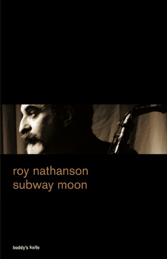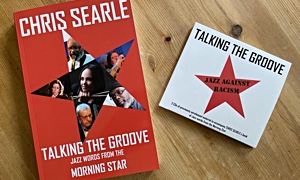Home » Jazz Articles » Book Review » Subway Moon
Subway Moon
 Subway Moon
Subway Moon Roy Nathanson
Soft cover; 134 pages
ISBN 978-3-00-025376-8
Buddy's Knife
2009
Poetry, like music, is about movement. Both art forms move from one note, or word, to another, trying to catch the essence of the moment. Saxophonist and composer Roy Nathanson has long worked with both words and music, sometimes uniting the two as he did on Sotto Voce (Aum Fidelity, 2006). Subway Moon, however, represents the first comprehensive overview of Nathanson's work as a poet.
The work derives much of its fascination from the New York City subway. The poems are written on the trains, while moving from one station to another. Like music, they carry the imprint of improvisation, occasionally referencing jazz musicians, as in the opening poem, "Saxophones": "Lying together under really old stars / we often tell things that already happened / We hope Billie and Lester / Will rent us rooms that won't be raided / that their silver spoons will cover our eyes / park the bones of our uniforms."
It's no coincidence that Nathanson references singer Billie Holiday and tenor saxophonist Lester Young. The tone of his poems isn't the easy swing of clarinetist Benny Goodman, but the blues of Holiday and Young. Through words, Nathanson observes the life around him with a bittersweet gentleness, as when he zooms in on one of the passengers in the train in "Subway Noah": "Two eyes glazed / Two earphones plugged in / Two brown hands / clutching white tissues / between pink knuckles / around sleek silver pole."
"Subway Noah" portrays the modern ark of humanity where lack of communication and silent distance is the rule. Nathanson's project, like a Trojan horse, is to break through the silence with words of wisdom and a cry for compassion. While the setting is formally limited to the subway, the poet's words float across time and space, past and present. There's also a touch of political satire in "Dear Karl," a poem written for Karl Rove. But Nathanson never falls into the pitfalls of preaching, there's a healthy dose of self-irony underneath the political message: "Look, Karl, I'm over here by the blue house / sipping tea from the cup with the self-evident truths."
Nathanson is a political writer in the sense that he writes about the world around him, a world that also includes war and terror. The most important source of the poems, however, comes from the poet's own life. Interspersed between reflections on music, politics and every-day life come a handful of poems linked to childhood and memory. One of the best of these is "My Successive Deaths," lamenting the passing of Nathanson's brother, mother and father, with the third stanza devoted to the father: "We played 'Someone to Watch Over Me' as his breath seeped from his tenor / Cool air blew the past down the hall / past my baby's rosy cheeks, right / into these dulled bones that dance this new life." The father's death is treated more extensively in the last section of the book, a prose memoir called "Father's Day," which describes in heartbreaking detail the father's slow decline through Alzheimer's disease.
Subway Moon is a book that isn't afraid to address the darker aspects of life, but it does so in uplifting way; it's a blues howl written in words as sensitive to sound as music. A work filled with compassion and hope but also with a degree of quiet despair.
< Previous
Like Water
Next >
Bandwidth
Comments
About Roy Nathanson
Instrument: Saxophone
Related Articles | Concerts | Albums | Photos | Similar ToTags
For the Love of Jazz
 All About Jazz has been a pillar of jazz since 1995, championing it as an art form and, more importantly, supporting the musicians who create it. Our enduring commitment has made "AAJ" one of the most culturally important websites of its kind, read by hundreds of thousands of fans, musicians and industry figures every month.
All About Jazz has been a pillar of jazz since 1995, championing it as an art form and, more importantly, supporting the musicians who create it. Our enduring commitment has made "AAJ" one of the most culturally important websites of its kind, read by hundreds of thousands of fans, musicians and industry figures every month.























